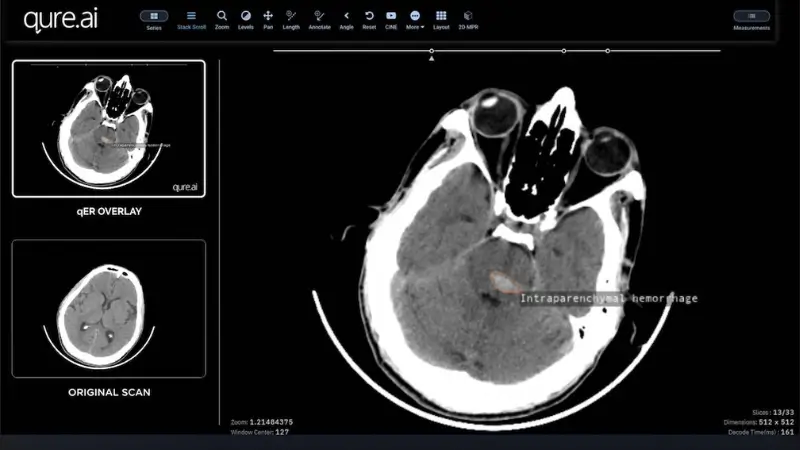qER™
AI solution for emergency diagnosis in cranial scanning
qER™ is a tool that assists the radiologist and emergency services in the detection of bleeding and brain trauma.

Automatic detection, and localization of critical brain pathologies
qER™ detects intracerebral bleeds and their subtypes, infarcts, tumor mass effects, midline deviation, and cranial fractures.
Automatic classification and triage of abnormal examinations within a work list
The qER™ algorithm offers radiologists and emergency physicians a global overview of the AI results of all examinations of the day. Critical cases are highlighted and easily identifiable
Automated report generation incorporating annotated image and detected and located pathologies
qER™ generates a pre-filled report that contains the annotated images, criticality information, and all detected abnormalities and their locations
Prioritize the flow in the emergency room and improve patient care with the triage solution.
Save time by fully automating the detection of certain pathologies
Integrate AI support directly into your existing infrastructure and your usual clinical workflow
Save time, secure your diagnosis and optimize your workflow with Incepto
Publications
-
Artificial intelligence pinpoints nine different abnormalities in head scans. Emily Mullin. Nature Medicine (2018). doi:10.1038/d41591-018-00003-4.
-
Chilamkurthy, Sasank, Rohit Ghosh, Swetha Tanamala, Mustafa Biviji, Norbert G Campeau, Vasantha Kumar Venugopal, Vidur Mahajan, Pooja Rao, and Prashant Warier. “Deep Learning Algorithms for Detection of Critical Findings in Head CT Scans: A Retrospective Study.” The Lancet 392, no. 10162 (December 2018): 2388–96. https://doi.org/10.1016/S0140-6736(18)31645-3.
-
Development and Validation of Deep Learning Algorithms for Detection of Critical Findings in Head CT Scans. S. Chilamkurthy, et al. https://doi.org/10.1371/journal.pone.0204155
-
National trends in use of computed tomography in the emergency department. Kocher, K. E. et al. Ann. Emerg. Med 58, 452–462 (2011).
Regulatory
Contact us to know if this product is available in your country.

